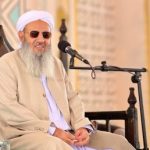 A bomb in southwestern Pakistan has killed at least 85 and left more than 200 others injured, activists in Balochistan have reported.
A bomb in southwestern Pakistan has killed at least 85 and left more than 200 others injured, activists in Balochistan have reported.
The improvised explosive device, which was attached to a motorbike outside a vegetable market in Quetta, targeted Pakistan’s minority Shia population.
A local shop owner in Quetta told Al Jazeera he was 50 metres from the blast site.
“It was close to sunset when I heard the blast. The market is entirely closed now.”
Activists say women and children were shopping for groceries in the Hazara Town enclave at the time of the attack.
“Rescuers and volunteers are hesitant to go near the blast site for fear of another explosion”, Haider Changezi, a Shia activist in Pakistan, told Al Jazeera.
The fear of follow-up attacks targeting the Hazara Shia population comes a month after twin blasts killed at least 90 people on Almadar Road, another highly Hazara area of the provincial capital of Balochistan.
Hospital sources tell Al Jazeera that many of the wounded are in critical condition and that the death toll is likely to rise.
Al Jazeera’s Imtiaz Tyab, reporting from Islamabad, said the entire area of the attack in Hazara Town has been cordoned off by security officials.
“Nobody can get in, nobody can get out” of the enclave.
Hazara Town, one of two Hazara enclaves in Quetta, is considered to be less economically affluent than Almadar Road, “poor families suffered”, Changezi told Al Jazeera.
Lashkar-e-Jhangvi, the banned pro-Sunni sectarian group, has claimed responsibility for Saturday’s attack.
The group also claimed responsibility for the January 10 twin bombings that killed more than 90 and led to a 76-hour sit-in demanding protection from the targeted killings.It has been banned since 2001.
Malik Siraj Akbar, the editor of Balochistan’s first English news website, “The Baloch Hal”, told Al Jazeera that the Pakistani government has not had a policy of countering sectarianism in the soutwestern region Balochistan, which is a base for Lashkar-e-Jhangvi and other armed Sunni groups.
“Just last month Human Rights Watch came up with a report that blamed the Pakistani military for supporting the Sunni militant groups.”
Sayed Qamar Haider Zaidi, a spokesperson for shia groups in the area, condemned the Pakistani government for not providing protection to the community, and announced three days of mourning and protest over the attack.
Last year was the deadliest so far for Pakistan’s Shia community, which accounts for 20 percent of the population, with more thsn 400 people dead in targeted killings. Violence has been especially intense in Balochistan.
Source: Al Jazeera and agencies











Comments